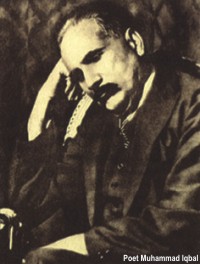|
Tribute
Revisiting Iqbal's 'Gabriel's wing'
A tribute by singer-writer Mustafa Zaman Abbasi on poet Muhammad Iqbal's 72nd death anniversary
 The Prophet saw the wings from near. The mountain of Hera engulfed and lighted with the image of Gabriel when he appeared in his majesty with 600 wings and proclaimed: 'Read, in the name of Allah'. Muslim poets from Hafiz, Attar, Iqbal, Nazrul to Farroukh Ahmed have extensively interpreted the Quran and written on the Prophet[sm]. The Prophet saw the wings from near. The mountain of Hera engulfed and lighted with the image of Gabriel when he appeared in his majesty with 600 wings and proclaimed: 'Read, in the name of Allah'. Muslim poets from Hafiz, Attar, Iqbal, Nazrul to Farroukh Ahmed have extensively interpreted the Quran and written on the Prophet[sm].
The world is not the same after 9/11. The unexpected happenings swayed a new surge in the minds of common people and readers in the west, provoking them to study Islam and Prophet Muhammad [sm]. When so-called Muslim 'heroes' sacrificed their own lives killing 3,000 innocent people, questions came up in the western press and the media whether those were true followers of the Prophet (sm). Journalists and scholars were baffled when they tried to locate a single reference in the life of the Prophet where he could have suggested self-immolation and violence of this nature. There were none. Bookstores welcomed volumes of new studies. It was indicative of western desire to know Islam. Then popular authors like Annemarie Schimmel, Karen Armstrong, Peter Lings and others devoted pages in their books to bring to the fore the softer and kinder side of Islam. They succeeded to a great extent until the blow of 9/11. A new wave of books on Islam is seen again.
The western approach changed significantly as the study removes the dust of confusion and mistrust, but a reader in my century and beyond must devote a little more time to read and reread his life to suit his or her own needs too. Nothing is lost as new complex situations are created in a world of confusion. Digital arms can destroy the world in minutes. Atomic arsenals may go into the hands of criminals who do not have the risk of a state. Nobody is safe today. Machines have taken out the charm of living from most wealthy nations. Predictions are full of horror. We come to books like Muhammad Iqbal's Bal-i-Jibril or Gabriel's Wing, once again to drink deep from the fountain of Muhammad [sm].
While holding in hand Dr. Schimmel's treatise on Gabriel's Wing, and the translation into Bengali by Shahed Ali, Jibrailer Dana, one is filled with awe and renewed inspiration. Dr. Annemarie Schimmel has produced a number of books on Muhammad Iqbal. Her book, a study into the religious ideas of the spiritual poet, is still the finest specimen of her erudition and insight on Iqbal study and Islamic thought.
So what were his religious motives in giving such excellent poetry to his audience? Lt. Col. Ferrier wrote: 'His poetic temperament have created in his mind so attractive and so inspiring a picture of the simplicity, the force and the appeal of early Islam that his main preoccupation centres round a return to that simple creed in order to regain that what he believes Islam to have lost'. He was endeavouring to find out the real meaning to come to this earth, when he says religion is a force to find one's self [maktu. 7]. In his lectures, Iqbal analysed in great detail the mystic and prophetic type of religious experience. Iman or faith is defined by him as the vital way of appropriating the universe [Lec. 109].
The poet mentioned four deaths which threaten the Islamic world of today: the Sufi-Shaikh, the mollah, the money lender and the governor. One is amazed to read his open letter to Pandit Nehru on Mollaism, Mysticism and Muslim kings. The mollahs who are the representatives of Islam, have been attacked by Iqbal on many occasions. The reason is: they are half-baked Alems, who are not introduced to the real Islam. What is real Islam then? Maulana Jalaluddin Rumi was once asked what was more important than salat or prayer. He answered: "more important than prayer is the soul of prayer." Similarly, more important than being a Muslim in name or appearance is to be a Muslim at the roots or in the soul or in the spirit of Islam. I wondered in the pages of Iqbal and found that in each sentence that he uttered, the spirit of Islam reigned supreme.
 Millions of Bangladeshis are migrants in North America, Arab countries, Europe and Australia. The new migrants usually take with them a copy of the Quran, the Hadith, few records of their songs, that's all. They throng around the new mosques which they build in their new environments. When I mention to them about the Tarana of Iqbal where he says, "chino arab hamara, hindustan hamara / muslim hai ham watan hai sara jahan hamara", and the significance of the song, they readily realise that for a Muslim there is no boundary of nationalism. He can be a citizen of any country and be a hundred percent true Muslim. Millions of Bangladeshis are migrants in North America, Arab countries, Europe and Australia. The new migrants usually take with them a copy of the Quran, the Hadith, few records of their songs, that's all. They throng around the new mosques which they build in their new environments. When I mention to them about the Tarana of Iqbal where he says, "chino arab hamara, hindustan hamara / muslim hai ham watan hai sara jahan hamara", and the significance of the song, they readily realise that for a Muslim there is no boundary of nationalism. He can be a citizen of any country and be a hundred percent true Muslim.
The new generation is not exposed to the wealth of writings on the real spirit of Islam in the books left behind by stalwarts. Gradually, a band of young enthusiastic poets and writers are appearing on the scene, who would like to know more about the past glory of Islam, not so much for the sake of revivalism, but for being properly stationed in identity.
The message of Iqbal brings internationality of Islam and the unity of mankind. To receive his message is to accept modernity of religion impregnated in the culture. We shed our blood to honour our language and freedom. The same is true of Islam.
'Gabriel's wing' is not a translation of 'Bal-i- Jibril' of Iqbal, but a fuller study of Iqbal's philosophy as depicted in his books. His quest was to bring resurrection to the spiritual death as he says in the Jupiter-heaven in the Javidnama. He tells his nation of the infinite possibilities poignant in the worlds of the Quran which opens ever new worlds before its readers. Opening Gabriel's wing, opens new insights. Iqbal's constant emphasis is on the alternating stages of khalwa and jilwa-a person's lonely, loving discourse with God in prayer and the manifestation in the world of what one has experienced in this dialogue. This is one of the central aspects of prophetic religion. God's Beauty and Majesty, Mercy and Justice with his divine word of creation kun through the centuries, guided Iqbal's spiritual world.
Schimmel arrives at her study of 'Gabriel's wing' on the totality of Iqbal's philosophy as available in Asrar i khudi, Rumuz i bekhudi, Payam i mashriq, Bang i bara, Zabur i anzam, Gulshan i raz, Raz i jedid, Javidnama, Bal-i- Jibril, Zarbi kalim, Armagan i hijaz, Maktubat, Iqbal's speeches and statements. A survey of his life, artistic and theological ideas during his time, his ways of thinking, arguing and suffering, all are intertwined in this treatise. His interpretation of five pillars of Islam, and his interpretations of the essential of the faith are the most important features of the book. In Asrar, Iqbal mentions:
'He is the meaning of Gabriel and the Quran
He is the watchman of the wisdom of God,
His wisdom is higher than reason'.
About the basic unity of Indic humanity in Turkey, Iran, Afghanistan, Pakistan, India, Bangladesh, his words are still so prophetic:
'Neither are we Afghans nor Turks,
nor yet from the lands of Central Asia
We belong to the garden, and descend from the same ancestors.
Forbidden unto us are the distinctions of color or race,
Yes! we are harvest of a new spring'.
Copyright
(R) thedailystar.net 2010
|

